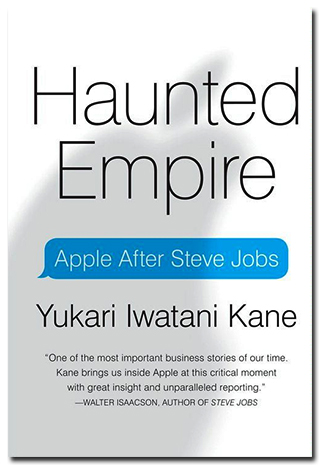Haunted Empire, book review: Apple's post-Jobs prospects


The death of Steve Jobs has left a huge hole in Apple, and the question remains of how to fill it.
Yakari Iwatani Kane spent two years putting together Haunted Empire: Apple After Steve Jobs, interviewing over 200 sources — an achievement, given that the Apple community is close-knit and journalists are not usually welcome.
That exhaustive research shows right from the start in the detail about Jobs's final battle with pancreatic cancer, which I found touching and respectful.
Haunted Empire is an excellent read. Of course, Apple's story — its garage-based genesis under the two Steves (Jobs and Wozniak), the NeXT interlude, Jobs's return to lead the company to unprecedented success — has always been engrossing. In her book, Kane describes how Apple, at the peak of its success, was swept off-course by Jobs's illness.
Kane writes well and, thankfully, is not judgemental — in marked contrast to many Apple fans.
I only met Jobs a couple of times at conferences, but I miss him — and not just because he was good for copy. He had personality in spades, including a sense of humour, and could command the attention of any room he was in effortlessly.
Much of the controversy around this book concerns a couple of areas: Jobs's famously prickly personality, and what Apple is going to do without him at the helm.
Jobs was certainly difficult — a fact that I witnessed in person, as did many others on a daily basis. But when you think about it — so what? Thanks to Jobs, Apple came to dominate the IT market in a way, and with a style, that no other company could match.
So what happens next? Kane's view is that Apple can no longer be the same company. She believes its best days are behind it and she comes up with some convincing-sounding arguments.
Jobs: irreplaceable?
Kane's main argument is a simple one: Steve Jobs was arguably the most charismatic leader the technology world has ever known, and Apple can't replace him.
If you lose a CEO like Steve Jobs, you have to do things differently, which Apple is doing — by replacing him with a team. New CEO Tim Cook has an impeccable track record overseeing the operational side of the company, while Jony Ive is the man behind the industrial design of the iPhone, iPad and iMac (and now the software experience too). Together, Cook and Ive should have what it takes to guide Apple successfully — after all, Bill Gates and Steve Ballmer did the job for Microsoft.
Many disagree with Kane's analysis — including Tim Cook himself, who told news TV channel CNBC: "This nonsense belongs with some of the other books I've read about Apple. It fails to capture Apple, Steve, or anyone else in the company. Apple has over 85,000 employees that come to work each day to do their best work, to create the world's best products, to put their mark in the universe and leave it better than they found it. This has been the heart of Apple from day one and will remain at the heart for decades to come. I am very confident about our future."
People in the IT business are usually quite relaxed about adverse press comment. They get it all the time, and most think the best solution is to ignore it — if you talk about it, you draw attention to it and give journalists a reason to write more about it.
Whatever the reason behind Cook's comments, Apple remains one of the most successful businesses, finding the knack of making money almost indecently easy.
I would never have bet against Steve Jobs when he was alive, and I wouldn't be too quick to bet against his successors.